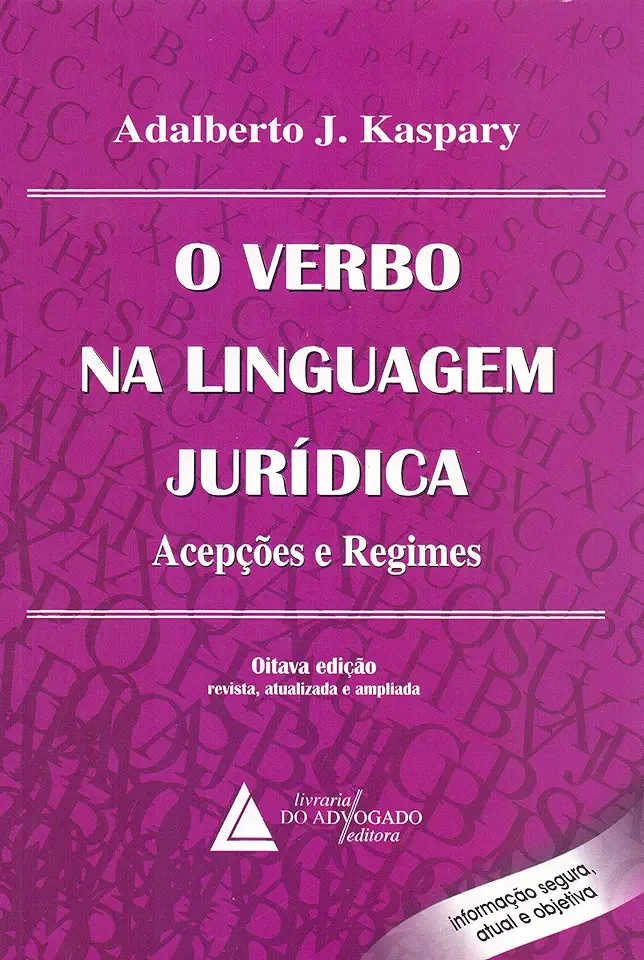
The Verb in Legal Language Meanings and Regimes - Adalberto J. Kaspary
The Verb in Legal Language: Meanings and Regimes
Introduction
In his book "The Verb in Legal Language: Meanings and Regimes", Adalberto J. Kaspary provides a comprehensive and insightful analysis of the verb in legal language. Drawing on a wealth of examples from a variety of legal texts, Kaspary explores the different meanings and functions of verbs in legal contexts and argues for a more nuanced understanding of their role in shaping legal discourse.
Key Themes
1. The Multifaceted Nature of Verbs in Legal Language
Kaspary begins by highlighting the multifaceted nature of verbs in legal language. He argues that verbs are not simply neutral tools for expressing actions or events, but rather play a crucial role in shaping the meaning and interpretation of legal texts. Through a detailed analysis of various verb forms, including active and passive voice, modal verbs, and performative verbs, Kaspary demonstrates how verbs can convey subtle nuances of meaning and create different legal effects.
2. The Role of Verbs in Legal Regimes
Kaspary then explores the role of verbs in shaping legal regimes. He argues that verbs are not merely descriptive elements, but rather performative acts that create, modify, or extinguish legal rights and obligations. By analyzing the verbs used in legal rules, regulations, and contracts, Kaspary reveals how they establish legal relationships, allocate responsibilities, and determine the consequences of legal actions.
3. The Interaction of Verbs with Other Linguistic Elements
Kaspary also examines the interaction of verbs with other linguistic elements in legal language. He discusses how verbs interact with nouns, adjectives, and adverbs to create complex legal concepts and propositions. By analyzing the interplay of different parts of speech, Kaspary demonstrates how verbs contribute to the overall meaning and coherence of legal texts.
4. The Cultural and Historical Context of Verbs in Legal Language
Kaspary further explores the cultural and historical context of verbs in legal language. He argues that verbs reflect the values, beliefs, and social norms of the society in which they are used. By tracing the evolution of verb usage in legal texts over time, Kaspary provides a deeper understanding of the ways in which language shapes and is shaped by legal thought.
Conclusion
In conclusion, "The Verb in Legal Language: Meanings and Regimes" is a valuable resource for anyone interested in the intricacies of legal language. Kaspary's comprehensive analysis of verbs in legal contexts provides a fresh perspective on the role of language in shaping legal thought and practice. This book is a must-read for legal scholars, practitioners, and anyone seeking a deeper understanding of the language of the law.
Why You Should Buy This Book
If you are interested in the field of law or simply want to expand your knowledge of legal language, "The Verb in Legal Language: Meanings and Regimes" is a book you cannot afford to miss. Here are a few reasons why you should consider purchasing this book:
Comprehensive Analysis: Kaspary provides a comprehensive and in-depth analysis of verbs in legal language, covering a wide range of topics from the multifaceted nature of verbs to their role in legal regimes and their interaction with other linguistic elements.
Clear and Engaging Writing Style: Kaspary's writing style is clear, engaging, and accessible, making the book suitable for readers with varying levels of legal expertise.
Real-World Examples: The book is filled with real-world examples from a variety of legal texts, illustrating the practical application of the concepts discussed.
Thought-Provoking Insights: Kaspary offers thought-provoking insights into the cultural and historical context of verbs in legal language, providing a deeper understanding of the relationship between language and law.
Valuable Resource: "The Verb in Legal Language: Meanings and Regimes" is a valuable resource for legal scholars, practitioners, and anyone interested in the language of the law. It is a must-have addition to any legal library.
Enjoyed the summary? Discover all the details and take your reading to the next level — [click here to view the book on Amazon!]